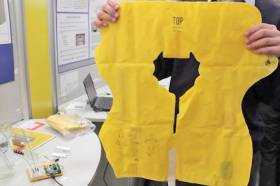Displaying items by tag: BT Young Scientist
Young Scientist Completes Study on Conservation of White-Clawed Crayfish With Marine Institute
Young student scientist Juliette Ó Súilleabháin recently completed a project studying the conservation of white-clawed crayfish with the support of the Marine Institute.
Juliette — a second-year student in St Mary’s Secondary School Mallow — approached the institute’s Marine Environment and Food Safety Services team about her individual project: Assessing the Presence of White-Clawed Crayfish (Austropotamobius pallipes) in the Blackwater catchment area of Mallow using Environmental DNA Analysis and the identification of possible Ark Sites.
The student accompanied staff on fieldwork so she could learn non-invasive sampling techniques for this protected species. Subsequently, she visited the labs and learned how to extract DNA and run PCRs.
Her project has since qualified in the Biological & Ecological category for the BT Young Scientist and Technology Exhibition, which opens to visitors from Thursday 11 January at Dublin’s RDS.
Juliette explained how her project came about: “I wanted to do a Young Scientist project on an ecological topic and contacted some ecologists for guidance. My original project involved the investigation of the presence and distribution of white-clawed crayfish (WCC) on the stretch of the Blackwater River where I live. A very recent crayfish plague outbreak in the Blackwater Catchment decimated the catchment’s crayfish population and put an end to my project.
“After further consultation, I chose the identification of potential WCC conservation ark sites as an alternative project topic. From my research, I learned about environmental DNA (eDNA) and the National Surveillance Programme for Crayfish Plague. I thought eDNA would be a useful tool in screening ark sites, so I contacted Bogna Griffin of the Marine Institute, and she kindly allowed me to accompany her on an eDNA sampling field trip to the Blackwater Catchment, and subsequently invited me to conduct eDNA laboratory work for my project in the Marine Institute in Oranmore, Co Galway.
“A massive thank-you to Bogna and the Marine Institute for giving me such a wonderful experience of a fascinating science topic!”
Supervising scientist Bogna Griffin said: “I was very impressed with [Juliette’s] attitude, the level of her write-up, and the depth of her knowledge in ecology and molecular biology. We are all very proud of her in the Fish Health Unit and wish her and all students the best of luck in January at the exhibition.”
Staff from the Marine Institute will be on hand as part of the Department of Agriculture, Food and the Marine’s Labs exhibit at the 2024 BT Young Scientist and Technology Exhibition, which runs until Saturday 13 January. Tickets are available HERE.
Awards For Marine-Related Projects Among 2019 BT Young Scientists
Marine science-related projects were among those awarded at the 2019 BT Young Scientist & Technology Exhibition in Dublin yesterday (Friday 11 January).
Rachel Cotter and Jack Mullen, pupils of Coláiste Muire in Crosshaven, Co Cork, placed second in the intermediate group under the Biological & Ecological Sciences category for their project ‘From fish to fork – ingestion of microplastics by commercial fish off the Irish South Coast’.
The duo also took the Contest Unge Forskere award from Denmark’s young scientist competition for their fishery investigation.
Taking third place among senior individuals in the same category was Timothy McGrath of Killorglin Community College in Co Kerry , for his ‘systematic study into using halophyte species to develop a nutrient treatment biofilter to combat oceanic deadzones’.
Niamh Coffey, Claire Joy and Abby O’Leary of St Brigid’s Secondary School also in Co Kerry netted a display award for their investigation into the Presence of microplastics in freshwater lakes surrounding Killarney.
Full results of this year’s awards can be found on the BT Young Scientist & Technology Exhibition website. The exhibition closes at Dublin’s RDS this evening (Saturday 12 January) and features many more marine-related projects, including an innovative lifejacket design that could make work easier for rescuers.
Innovative Lifejacket Design From Young Scientist Could Make Work Easier For Rescuers
The son of an Irish Coast Guard volunteer from Co Clare is exhibiting his innovative lifejacket design at this year’s BT Young Scientist and Technology Exhibition at the RDS in Dublin.
As TheJournal.ie reports, 16-year-old Dylan Egan has been working on a new system for an automatically inflating vest that won’t react to splashes of water.
Egan’s design would also allow more experienced seafarers such as rescue personnel to toggle the auto-inflate function to make it more convenient when working at sea.
The BT Young Scientist and Technology Exhibition continues till tomorrow, Saturday 12 January.































































